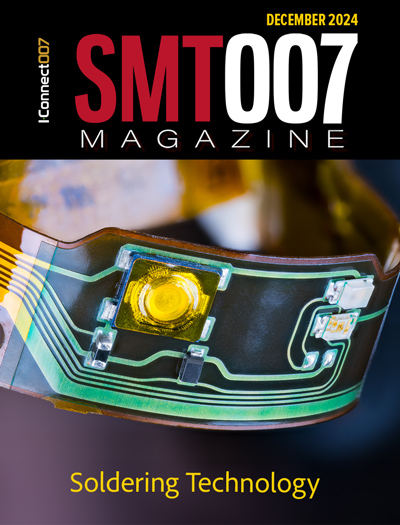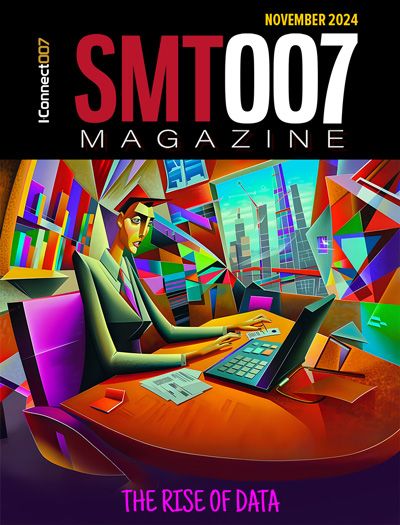-

- News
- Books
Featured Books
- smt007 Magazine
Latest Issues
Current Issue
The Path Ahead
What are you paying the most attention to as we enter 2025? Find out what we learned when we asked that question. Join us as we explore five main themes in the new year.

Soldering Technologies
Soldering is the heartbeat of assembly, and new developments are taking place to match the rest of the innovation in electronics. There are tried-and-true technologies for soldering. But new challenges in packaging, materials, and sustainability may be putting this key step in flux.

The Rise of Data
Analytics is a given in this industry, but the threshold is changing. If you think you're too small to invest in analytics, you may need to reconsider. So how do you do analytics better? What are the new tools, and how do you get started?
- Articles
- Columns
Search Console
- Links
- Media kit
||| MENU - smt007 Magazine
SEMI, Energy Collaborative Sponsors Meet with South Korea MOTIE Officials to Present Recommendations on Expanding Renewable Energy
June 4, 2024 | SEMIEstimated reading time: 3 minutes
SEMI, the industry association serving the global electronics design and manufacturing supply chain, as part of its Energy Collaborative (EC) Initiative, and EC Sponsors met with South Korea’s Ministry of Trade, Industry and Energy to discuss the EC analysis, recommendations and solutions to expanding access of the region’s semiconductor ecosystem to renewable energy – a critical factor for the South Korea chip supply chain to meet its net zero goals.
“Growing demand for low-carbon energy (LCE) electricity is a concern for all manufacturing sectors, but especially for semiconductors as they are critical to many aspects of economic growth and the engine of the information economy,“ said Dr. Mousumi Bhat, Vice President of Sustainability Programs at SEMI. “Transitioning to LCE is vital for the chip industry to meet its commitments to decarbonize. Reducing the carbon footprint of South Korea’s production of chips and the electronic devices they enable is a key part of this work.”
The SEMI EC co-hosted the meeting with Solutions for Our Climate (SFOC) in partnership with the Asia Clean Energy Coalition (ACEC) and the Clean Energy Buyers Association (CEBA). SEMI EC Sponsors, ASML, Lam Research, Qualcomm and Samsung Electronics also attended to provide industry perspectives.
Analysis conducted by the Energy Collaborative shows that, even if South Korea were to meet its declared 2030 national target for 116 TWh of LCE, under current clean electricity procurement mechanisms available corporations would see a 30 to 100 TWh shortfall in LCE supply to meet their voluntary LCE adoption target by 2030, equivalent to 40% to 75% of total declared corporate targets.
The South Korean semiconductor industry accounts for 7% of South Korea’s GDP and is a key supplier to the country’s broader technology and manufacturing sectors. If the entire semiconductor and electronics manufacturing industry were to enhance its LCE adoption target in line with the 1.5°C pathway, it would add another 30 to 40 TWh per year to South Korea’s corporate LCE demand.
SEMI shared the following recommendations to help close the gap:
- Provide clear signaling of South Korea’s commitment to tripling global renewable energy capacity by 20301 by aligning its national energy targets with the 1.5C pathway.
- Drive down renewable energy generation costs by:
- Establishing a government-operated offshore wind zoning system in which projects are awarded to developers through auction to ensure market certainty.
- Introducing a central resource (one-stop shop) where developers can obtain permits from a single entity to reduce project lead time.
- Alleviating separation distance restrictions2 on solar PVs to increase its potential capacity.
- Ensure predictable and fair costs for renewable energy developers by setting fair regulatory standards on community benefit-sharing and grid curtailment.
- Accelerate grid reinforcement by adopting a government-led grid development system, streamlining the permitting process, and incentivizing private-sector financing.
- Facilitate greater corporate access to renewable energy procurement methods by ensuring that:
- Power Purchase Agreement (PPA) costs (e.g. network usage fees) are transparent and fair
- Green retail tariffs (including the Green Premium) directly contribute to carbon emission reductions
The analysis and its findings and recommendations will be available in a public report to be released in late June.
“We are pleased to partner with the SEMI Energy Collaborative in their efforts to increase access to solar and wind energy for the South Korea microelectronics industry and the region as a whole,” said Joojin Kim, CEO of Solutions for Our Climate (SFOC). “We urge the government and people of South Korea to reduce barriers to renewable energy installation to ensure our region remains an attractive and competitive place to live, work and prosper while reducing our impact on climate change.”
Suggested Items
Argonne to Lead Two Microelectronics Research Projects Under U.S. Department of Energy Initiative
01/13/2025 | BUSINESS WIREThe U.S. Department of Energy’s (DOE) Argonne National Laboratory is managing two microelectronics studies that will support multidisciplinary codesign of hardware and software and enable processing of vast quantities of data at unprecedented speeds.
SAMI-AEC Showcases Cutting-Edge Technological Solutions at IKTVA 2025
01/13/2025 | SAMISAMI Advanced Electronics Company (SAMI-AEC), a subsidiary of SAMI, is proud to announce its participation in the “IKTVA Forum and Exhibition 2025,” the region’s leading event for energy sector supply chains.
Incap India Enhances Share of Renewable Energy by Installing Solar Panels
01/10/2025 | IncapIncap India has completed the solar power project at its facilities in Tumkur, where 1,257 panels are fully installed, connected to the grid, and put into operation.
IMI Partners with a US-based Electric Mobility Manufacturer
01/10/2025 | IMIIntegrated Micro-Electronics, Inc. (IMI), a global multi-national electronics manufacturing company, proudly announced that it has entered into a strategic manufacturing partnership with LAND/LAND Energy, a Cleveland-based electric mobility manufacturer in the US. The collaboration will further accelerate new electric vehicle production globally.
Trane Technologies Completes Acquisition of BrainBox AI
01/03/2025 | BUSINESS WIRETrane Technologies, a global climate innovator, announced that it has completed the acquisition of BrainBox AI, a pioneer in autonomous HVAC controls and generative Artificial Intelligence (AI) building technology. The acquisition was previously announced in a press release on December 18, 2024.


